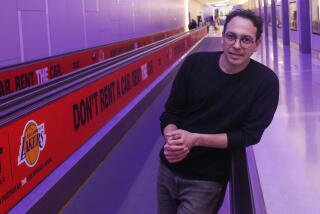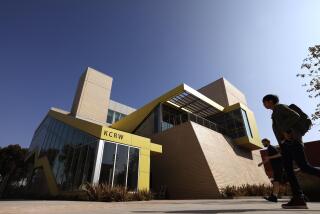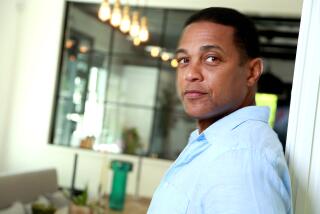On the Media: ‘Radiolab’ takes its audio smörgasbord on the road
The two guys who headline public radio’s long-running show on “science, wonder and discovery” can’t wait for their first national tour. Declares Jad Abumrad, the hipster and technical whiz: “We’re going to have the full-on groupies and the destroyed hotel rooms. Everything.” Rejoins his mike-mate, one-time ABC television science reporter Robert Krulwich: “I’m looking more for the wrapped fruit.”
That sort of counter-punching and drollery is just one of the charms of “Radiolab,” a favorite on more than 300 public radio stations and now on the verge of selling out stage shows in New York, Seattle and Los Angeles.
One fan, begging for a second show in Seattle later this month, pleaded on the duo’s website: “Seattle is the unequivocal mecca for navel gazers with over-sized brains.” But “Radiolab” is not merely a destination for the “Popular Science” crowd. The show has recently gotten shout-outs from actress Rachel McAdams, Mary Louise Parker of TV’s “Weeds” and indie rocker Neko Case.
“Rachel McAdams, she’s the hottie, right?” inquires Abumrad, 37, during an interview. “Mary Louise Parker,” adds Krulwich, 63, “is the most remarkably good looking person.” Which has nothing to do with anything, except that these two are obviously tickled to find that a radio show about the universe, the brain, gravity and even a mood-calming parrot can find its place in a noisy world.
“Radiolab,” which airs at 11 a.m. Sundays on KCRW 89.9 FM, mines the same rich vein of storytelling as another public radio favorite, “This American Life,” with a colloquial approach and rejection of the omniscient “voice of authority” of more traditional media. Abumrad and Krulwich, instead, take a voyage of discovery and bring their listeners along for the ride — a more peptic journey because of the delicious array of sounds, music, pregnant pauses and disparate voices (including from listeners) cooked into each show.
The show on “Symmetry” coming to UCLA’s Royce Hall March 23 and 24 (tickets for the second show remain, via the “Radiolab” website) will range over topics from the origins of the universe, to falling in love to “what our hair parts may say about us.” If you wondered where Clark Kent and Superman come down on the latter, this show has your answers.
The son of a scientist and a doctor, Abumrad was already a public radio veteran when, after the 9/11 attacks, his bosses at WNYC in New York gave him license to “just make some radio and see what happens.” A couple of years later, Krulwich joined as a guest. Chemistry ensued.
“Sometimes in life things happen. There are these accidents,” Krulwich says. “You don’t really account for it.” Now he talks about the sense of joy he gets in “playing” with the younger Abumrad — so much so that he was willing to leave ABC last year after 16 years of award-winning reporting.
A show on “Words” from last summer delivered the multiple viewpoints typical of “Radiolab’s” themed programs. (It, like other shows, remains available at Radiolab.org.) A Columbia University professor introduced the sublime: multiple phrases Shakespeare made part of the English lexicon — “dead as a doornail” and “in my mind’s eye,” to cite just a couple. A Harvard researcher, Jill Bolte Taylor, continued with the unexpected — her realization that a stroke had cleared the chatter from her head and left her with a profound sense of joy. Wrapping it all in the profound was the English neuropsychologist Paul Broks, with his theory that our sense of self is tied inextricably to language, allowing us to create stories about ourselves.
Says Krulwich: “When you meet people who are smarter than you are, you can ask them to give an answer. If we don’t understand what was said, we ask them to explain it again. This is a program where knowledge is sort of being won right in front of you.”
It doesn’t hurt that the “Radiolab” team finds riveting, real-life stories. A recent short piece, “A Flock of Two” features a mentally disturbed man whose pet African gray parrot can sense his impending rages. The bird then talks him to a calmer place.
You might not think you’d have much interest in a program on stress hormones. But what if its jumping off point was this story?: “My name is Colby Hall and I survived a fight with a boat propeller.”
“Radiolab’s” stress program was well nigh irresistible. Stanford scientist Robert Sapolsky explained how life-saving stress reactions, like that induced in the boat accident, become dangerous when they crop up in everyday life. The “tunnel clarity” of profound distress is needed only on extreme occasion, Sapolsky said; not so much when we obsess over whether “Social Security will be there in 30 years.”
An example of someone whose routine stress got out of control? What about the Victorian J.M. Barrie, the author of “Peter Pan,” who was so riven with anxiety, theory has it, that it stunted his growth. Who knew? Sapolsky did. And so did the “Radiolab” audience that caught the show “Stress.”
With a team of producers who list interests as diverse as chopping wood and coral reef construction, it’s no wonder that “Radiolab” keeps the idea pot burbling. And Abumrad helps stir it expertly, choreographing layers of sound, oddball interjections and quixotic peeks behind the curtain. If an interview subject asks a question about how he should answer for the program, most radio hosts would edit that out, but on “Radiolab” you hear the moment of candor.
“There is this weird tension between incredibly precise structure and architecture” of the shows, and “complete anarchy,” Abumrad says. The dynamic duo says that combination becomes even more evident in their live shows.
It all creates a sense of accessibility uncommon in radio or any medium.
Twitter: latimesrainey
More to Read
The biggest entertainment stories
Get our big stories about Hollywood, film, television, music, arts, culture and more right in your inbox as soon as they publish.
You may occasionally receive promotional content from the Los Angeles Times.







